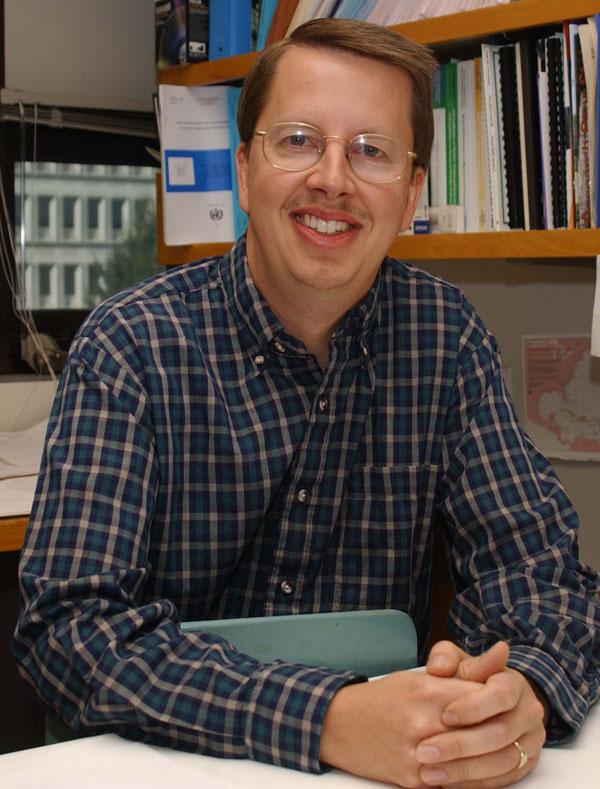ISU professor to unravel secrets of tornadoes at lecture
Courtesy of Iowa State University
ISU professor and storm chaser Bill Gallus will give a lecture on tornadoes Monday. He said he is dedicating the talk to his colleague who died in a tornado last May in Oklahoma.
November 18, 2013
For Bill Gallus, unraveling the secrets in the unpredictable world of tornadoes has been a difficult challenge.
Gallus, professor of geological and atmospheric sciences and storm chaser, will be discussing this world Monday, Nov. 18, during his lecture, “The Difficult Quest to Unravel the Secrets of the Tornado,” at 7 p.m. in the Great Hall at the Memorial Union.
“The key points in my lecture will be the various challenges that tornadoes present to researchers. Within discussion of those, I will discuss what we know about thunderstorm formation, development of rotation in storms and our best guesses as to the final ingredients that can result in a tornado,” Gallus said.
“I will also make the point that to get the information we need to understand tornadoes better, we have had to take some risks and place instruments in the path of the tornadoes. I will also talk a bit about what we have been able to learn about tornadoes through the damage they do.”
Gallus developed his passion for tornado research at a young age. He claims that researching tornadoes is his form of climbing Mt. Everest.
“I feel as though my passion for tornado research and storm chasing has always been present; it is simply a fact of life coming from the fact that I am fascinated by weather. Similar to a mountain-climber really wanting to tackle Mt. Everest because it is the highest mountain, most of us who are interested in weather want to witness a tornado because it can be thought of as having the most extreme weather,” Gallus said.
One of Gallus’ fellow professor of geological and atmospheric sciences, William Gutowski, stressed the importance of tornado awareness.
“Tornadoes can be extremely dangerous. People need to be given clear facts without embellishment about how unpredictable tornadoes are and the destruction they can cause. I get concerned when I see people thinking of storm chasing as something fun and exciting to do,” Gutowski said.
Gutowski said Gallus’ lecture is a good way to beef up a person’s knowledge of tornadoes along with other extreme weather.
“The most immediate way [to learn about tornadoes] is to attend Bill’s lecture, and ask him questions. He is an expert on this topic,” Gutowski said.
Gallus said he hopes people walk away from his lecture armed with a better sense of how tornadoes work.
“I hope people leave the lecture knowing what is needed for the atmosphere to produce a tornado, and knowing why we still cannot accurately determine which storms will produce tornadoes and which will not. I also hope they understand why some tornado researchers have to put themselves in harm’s way,” Gallus said.
“I am not sure if people are well-educated about tornadoes. I would guess they don’t understand how they form, at least not in detail, but I would also guess they do understand that they are destructive. Perhaps the biggest thing I think people do not understand is how hard it can be to stay safe in a strong tornado. Just because you go into a bathroom or basement does not mean you will be fine.”
Gallus also said there are many ways to expand your knowledge on extreme weather besides his lecture.
“People can become more aware of the dangers if they do a little research. The National Weather Service provides information over the Internet. Media coverage of big events like the Joplin tornado should make people think and become better aware of how bad tornadoes can be. In general, after a near miss, people improve their actions regarding tornado safety.”
Gallus stated that he will be dedicating the lecture to Tim Samaras, a colleague of his who died following a tornado in Oklahoma in May 2013.
“I guess I find it somewhat healing to be able to dedicate the talk to him,” Gallus said. “In a professional scientific relationship, it seems like you make a point to stay focused on the job to be done, and you don’t often talk about other things like feelings or telling the collaborator how you value them.”
“When someone passes away, you lose those opportunities. Being able to dedicate this talk to Tim, who gave me some of the more interesting slides and videos that I will show, feels like an opportunity to express how much I valued his friendship and collaboration.”

















